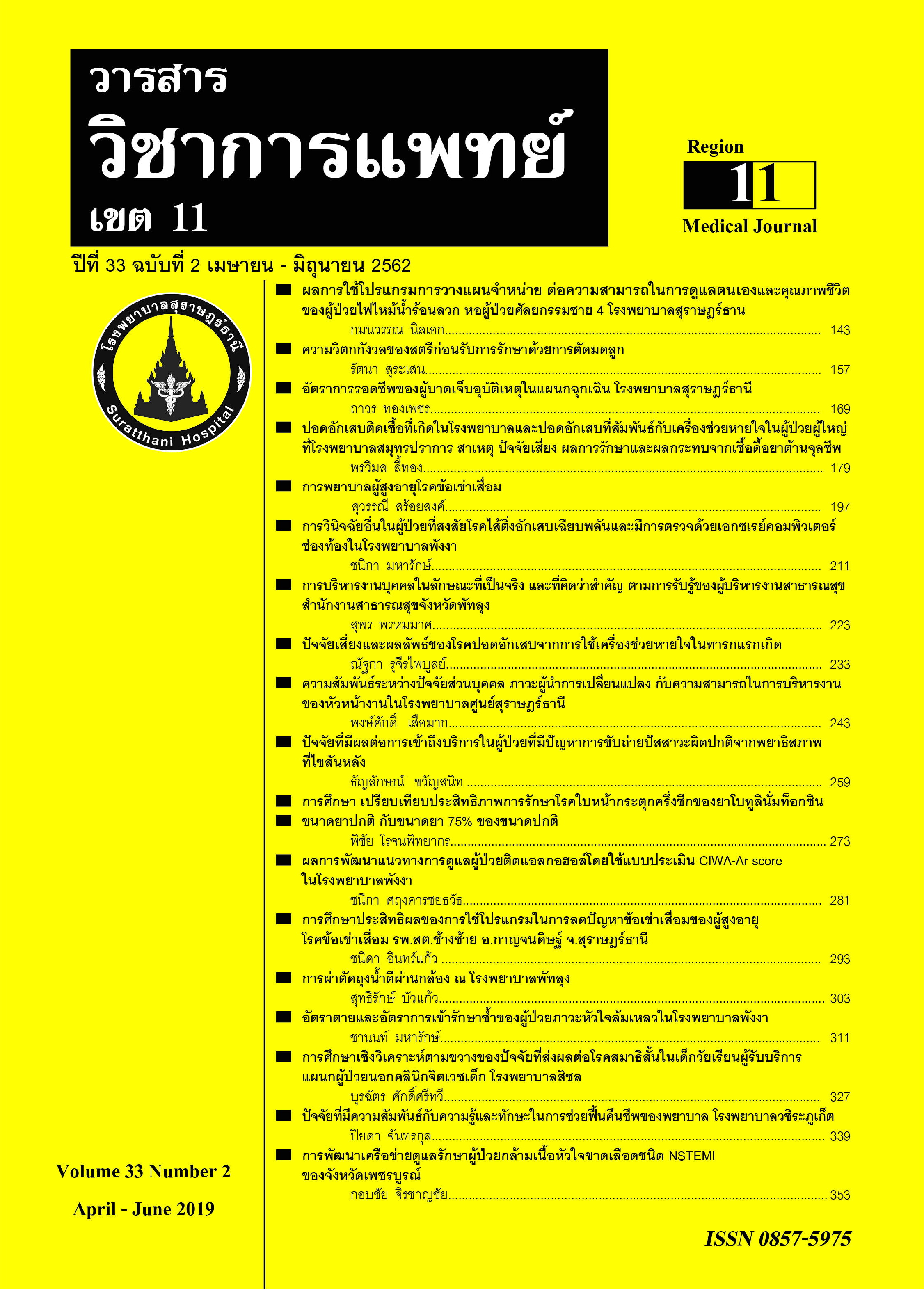An outcome of developing a patient care procedure using the CIWA-Ar score for alcohol-dependent patients at Phang-Nga hospital
Keywords:
Alcohol dependence, CIWA-Ar scoreAbstract
This retrospective cohort study aimed to examine the clinical characteristics of alcohol-dependent patients, the outcome of implementing the alcohol withdrawal assessment scoring guidelines (CIWA - Ar), incidence of patient complications, medical restraint and deaths. This study was methodologically conducted to the group of the alcohol-dependent patients between July 1, 2016 and July 31, 2018.
The findings disclosed that 1). 91.63% of the total of 215 alcohol-dependent patients were male. Their average ager were 49 years old. They were employed as workers across industries. The average length of hospital stay was 4.6 days. 2). 26.98% of participants received the CIWA-Ar score assessment. 3). The group received CIWA-Ar statistically and had the most “alcohol withdrawal state, with delirium” complication (31%). 4). There are 1.27% of the alcohol withdrawal state, with convulsion. This situation occurred only to the patients who did not received CIWA-Ar. 5). Medical complication and patient restraint were significantly recorded (P<.05) in patients received CIWA-Ar assessment.
In summary, this study revealed that the execution of the patient care procedure was not widely implemented during the hospitalized treatment. Furthermore, it was only used to evaluate the patients’ condition after the complication was noticed. Consequently, this caused further executions of patient restraint and an additional period of hospitalized treatment.
References
2. พันธุนภา กิตติรัตนไพบูลย์, หทัยชนนี บุญเจริญ, และสุนทรี ศรีโกไสย บรรณาธิการ. แนวเวชปฏิบัติการให้บริการผู้มีปัญหาสุขภาพจิตจากแอลกอฮอล์ในโรงพยาบาลทั่วไปและโรงพยาบาลชุมชน Clinical Guideline of Alcohol Management in General and Community Hospitals, พิมพ์ครั้งที่ 1. เชียงใหม่: โรงพยาบาลสวนปรุง. กรมสุขภาพจิต; 2549.
3. Pirmohamed M.et al. The burden of alcohol misuse on an inner-city general hospital. Q J Med. 2000; 93: 291-295.
4. แนวปฏิบัติการดูแลผู้ป่วยภาวะขาดสุรา. ปทุมธานี: สถาบันบำบัดรักษาและฟื้นฟูผู้ติดยาเสพติดแห่งชาติบรมราชชนนี กรมการแพทย์; 2558.
5. Mainerova B., Prasko J., Latalova K. Alcohol withdrawal delirium-diagnosis, course, and treatment. Biomed Pap 2015;159: 44–52.
6. สุวรรณา อรุณพงค์ไพศาล.การป้องกันและรักษาภาวะถอนพิษสุรา. แผนงานพัฒนาระบบ รูปแบบ และวิธีการบำบัดรักษาผู้มีปัญหาการบริโภคสุราแบบบูรณาการ,พิมพ์ครั้งที่ 3. เชียงใหม่: วนิดาการพิมพ์;2553.
7. Sullivan, J.T., Sykora, K., Schneiderman J., Naranjo, C.A., Seller E.M. Assessment of alcohol withdrawal: The revised Clinical Institute Withdrawal Assessment for Alcohol scale (CIWA-Ar). Br J Addict 1989; 84: 1353-57.
8. ณัฐกฤตา ขันตี. ปัจจัยคัดสรรที่สัมพันธ์กับภาวะถอนพิษสุราของผู้ป่วยเสพติดแอลกอฮอล์. [วิทยานิพนธ์ปริญญาพยาบาลศาสตรมหาบัณฑิต]. กรุงเทพฯ: จุฬาลงกรณ์มหาวิทยาลัย; 2556.
9. HUSAIN O.M. et al. Unplanned alcohol withdrawal: a survey of consecutive admissions to an acute medical unit in 2010 and 2011. Q J Med 2013; 106:43–49
10. Mukherjee S. Alcoholism and its Effects on the Central Nervous System. Current Neurovascular Research. 2013;10(3):256-62.
11. จิราภรณ์ เตชะอุดมเดช, เปรมฤทัย น้อยหมื่นไวย, และเดชา ทำดี. ปัจจัยที่มีอิทธิพลต่อประสิทธิผลของการทำงานเป็นทีมของพยาบาลวิชาชีพโรงพยาบาลมหาราชนครเชียงใหม่. Nursing Journal 2016;43:117-127
12. นันทวัช สิทธิรักษ์. จิตเวช ศิริราช DSM-5/ภาควิชาจิตเวชศาสตร์ คณะแพทยศาสตร์ศิริราชพยาบาล มหาวิทยาลัยมหิดล, พิมพ์ครั้งที่ 1. กรุงเทพฯ: ประยูรสาส์นไทยการพิมพ์; 2558.
13. Mainerova B. Alcohol withdrawal delirium - diagnosis, course and treatment Biomed Pap Med Fac Univ Palacky Olomouc Czech Repub. 2015; 159: 44-52.
14. วงเดือน เพชรสังหาร. พัฒนาแนวปฏิบัติในการดูแลรักษาผู้ป่วยที่มีภาวะถอนพิษสุรา. [อินเตอร์เน็ต]. 2561 [เข้าถึงเมื่อ 2561 ก.ค. 22]. เข้าถึงได้จาก http://mkho.moph.go.th/research2018/showdata2. php?id=65
15. Foy A., Kay J. and Taylor A. The course of alcohol withdrawal in a general hospital. Q J Med 1997; 90: 253–261
16. Kaplan H.I, Sadock B.J. Synopsis of psychaitry. 8 th ed. Baltimore: William & Wilkins; 1998.
17. Barclay G. A., Barbour J., Stewart S., Day C. P. & Gilvarry E.. Adverse physical effects of alcohol misuse. Advances in Psychiatric Treatment 2008; 14: 139–151.
18. นันทวัช สิทธิรักษ์. แนวทางการดูแลผู้ป่วยที่ได้รับการผูกยึด. วารสารสมาคมจิตแพทย์แห่งประเทศไทย.2552; 54 : 385-398.






